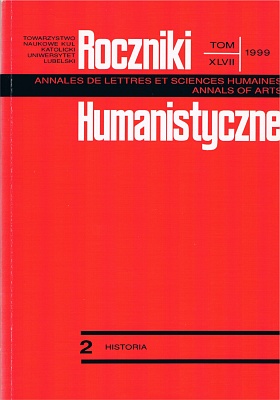Służba Józefa Nakoniecznego ojczyźnie i narodowi (1879-1915)
Abstrakt
The figure of Józef Nakonieczny has not yet been properly discussed in the Polish historiography. He worked in many areas in the national-democratic movement in the first fifteen years of the twentieth century. His appearance on the Polish political stage proved that the programme formulated by the leaders of this political movement was successfully realized and had definite results: the social class that for ages had not belonged to the nation in the political sense of the term, i.e. the peasantry, reached for a place in the society that they truly deserved. Nakonieczny, like other peasant activists who were under the influence of the national-democratic fraction (J. Błyskosz, W. Wiącek, P. Żak, K. Dułgoborski, M. Manterys, J. Łaszcz, J. Ostrowski) takes an active and conscious part in the work of putting into effect the national programme. In the situation of national captivity, when the country and the nation were divided into three partitions belonging to the three neighbouring powers, if one was considering regaining independence, he had to include the whole peasantry in the process. Nakonieczny perfectly realized the fact that when a battle was going on against the extermination of our nation and when one wanted to oppose the rapacious Russification, strong bonds of national solidarism had to be built over the class and political divisions. In his social-political work with the peasantry in the Lublin region, he devoted himself totally to these problems. He defended the integrity of the Kingdom lands when the Russians tried to separate the Chełm district and include it in their empire. He confuted the attacks launched by the Russian Orthodox Church against the Catholic Church's possessions in the Russian partition. He frequently presented his views in this respect in the Duma − the Russian Parliament − in the years 1907-1914. Among the representatives of the class he came from, and not only among them, he gained respect and appreciation.
He constituted an important element in the political work of the national parties on the Polish territories. When he died in a car crash on 11 April 1915 it was a great loss for his party collegues: Z. Balicki, R. Dmowski, S. Kozicki, W. Jaroński. The peasants from the Lublin region lost an advocate of their problems. Crowds of many thousands of peasants, gentry, intelligentsia and clergy that gathered for his funeral proved this beyond all doubt.
Copyright (c) 1999 Roczniki Humanistyczne

Utwór dostępny jest na licencji Creative Commons Uznanie autorstwa – Użycie niekomercyjne – Bez utworów zależnych 4.0 Międzynarodowe.





